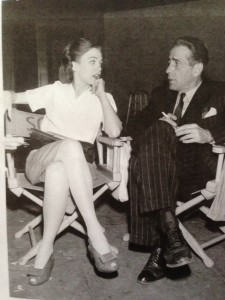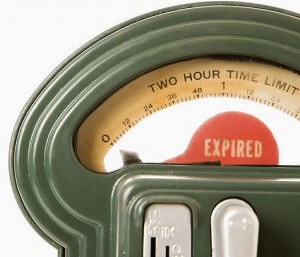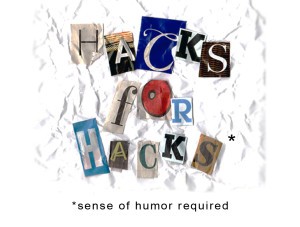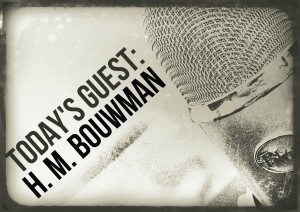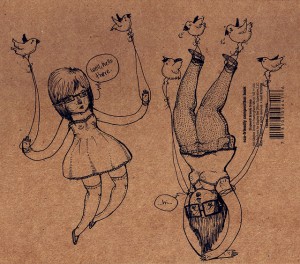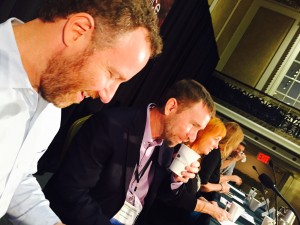Community
Mask (Tragedy and Comedy) by Anderson Mancini, Flickr CC
Writers, or artists and creatives in general, seem to be wired differently than the average person. We have the innate ability to feel more deeply; to become fully immersed in the entire spectrum of emotions – from the fiery depths of agony to the glorious heights of ecstasy – then reveal our experiences in such a way that a mere whisper of our happiness, or a whimper from the pain, is as much as most souls can handle.
It’s a blessing that often makes me curse.
Take, for instance, my most recent struggle. I’m not prone to bouts of sadness, but after my mother died a couple of summers ago, my cheerful state of mind steadily declined until, last March, I finally dropped my basket. I slid into such a deep depression, I was unable to write much of anything – hell, do much of anything – for most of the year. It was the hardest period of my life.
I Haven’t Got Time for the Pain
Shortly after her death, I tried to avoid the grief, to soften the blow I knew would come. I joined a support group; it didn’t take. I’m too empathetic. Instead of coping with one loss, each month I lived the heartaches of a half-dozen or more. I lasted about four meetings before dropping out.
I sought paid, professional help and even considered antidepressants, but decided on a more holistic approach: mega-doses of Omega-3’s. I won’t sugarcoat it (or maybe I should have); that was some pretty nasty stuff. By month’s end, I was burping raw tuna and attracting stray cats. We considered other alternatives.
Next came a Mindfulness-Based Therapeutic Lifestyle course to combat the Emotional Logic (“I’m depressed, therefore I must be a wuss.”) that Jan O’Hara discussed so proficiently in her article here. I learned how to breathe. Deeply. And how to do the downward- and upward-facing dog. And be a beautiful lotus flower floating in the stream. But deep inside, I was drowning.
By the time March rolled around, I’d lost all ability to focus; to produce. My days were spent in and out of bed, either under the covers crippled by sadness, or pacing the floor riddled with anxiety. My stomach was a bundle of nerves and I couldn’t eat. I dropped almost thirty pounds. Enjoyment of all things was gone.
Read MoreMy grandmother was born on an east Texas watermelon farm in 1922. At age 17, after she graduated from Beaumont High School, she left for Hollywood and danced in films alongside Mickey Rooney and Judy Garland, hobnobbed with Humphrey Bogart. After she met my grandfather, she left Hollywood and gave birth to four beautiful children, the oldest of whom is my mother. I am the oldest of nine grandchildren. I wish I had inherited her legs.
This past December, she died after a fifteen-year journey with Alzheimer’s, and throughout her decline, she was as light-filled and beautiful as Alzheimer’s is bleak and ugly. I remember, in the earlier stages of the disease, how she would bend down to study a flower with awe and wonder, or stop walking and raise her face to the sky to watch a bird soaring overhead. With childlike wonder, she noticed what we adults consider mundane.
My mother, so involved and committed to my grandmother’s comfort and well-being, intimately cared for my grandmother as the disease rendered her wholly dependent and vulnerable. There was such rawness in my grandmother’s vulnerability; sometimes witnessing the progression of the disease sucked the air from my lungs.
I think about vulnerability quite a lot in both my human life and my writer life. When we bare ourselves, we can feel very chilly. Vulnerability can be painful too: rug burns and splinters may occur with so much bareness. Have you ever poked a snail’s antennae-eyeball and watched it retract? Vulnerability can feel like we are the snails and some human schmo has bent down to intentionally poke our eyeball.
When we are vulnerable, we give someone else a piece of our self, not knowing how it will be received or whether there will be reciprocity. We simply open up our chests to another, hoping that person will appreciate or empathize with our desire to reveal the beauty of a beating heart, praying he will not run screaming.
CAUTION! SOME PEOPLE WILL RUN SCREAMING! That person over there, that sealed-tight, glass-skinned lady with the pretend smile? She likes Valentiney, heart-shaped things, but doesn’t like actual hearts, especially when they aren’t covered up with lots of layers of stuff.
And over there . . . that fellow in the brick box he has built for himself, with just a few gaps for air holes and sunlight, he’s terrified of all organs, especially warm, bare skin, our body’s largest organ of all. He stays in the brick box where it’s safe, where there’s no need to see others’ vulnerability, where there’s no reason to be vulnerable himself.
The decision to live with vulnerability allows others to poke us in sensitive places, but vulnerability can also leave us feeling wholly alive, invigorated and truthful. Vulnerability also connects us more intimately to others. If you’ve tried out vulnerability, you know I’m telling the truth.
Vulnerability: Good for Humans
In his picture-book-for-adults, V is for Vulnerable, Seth Godin, explains, when we are willing to be vulnerable with someone else, we create “imbalance” in the relationship . . . we are admitting that we struggle in some way, knowing full well that the other person might laugh at us, fear us, dislike us. But it’s that imbalance, Godin says, that leads to connection. Yes!
Read MoreWarning: Hacks for Hacks tips may have harmful side effects on your writing career, and should not be used by minors, adults, writers, poets, scribes, scriveners, journalists, or anybody.
Okay, real talk here.
Do you call yourself a writer? A capital-R-W Real Writer?
Sure, you spend your lunch breaks pecking away at your novel. You’ve got a blog and a Twitter you suspect people read. But is it really safe to label yourself a writer? Should you sell a short story first? Publish a book? Is the mere act of putting pen to paper enough, like how you only have to kill one person to be called a murderer? Or do you need to go to school for it, like a doctor or ninja? If so, fancy-schmancy writing workshops and MFA programs only accept a handful of students every year, leaving most writers out in the cold.
This week, the illustrious Neil Gaiman tweeted an endorsement of the Clarion Writer’s Workshop, a pricey, six-week writing retreat in California:
https://t.co/KxqDo9CY9y is where you apply to go to Clarion. If you want to be a writer, you want to go to Clarion, NEED to go to Clarion.
— Neil Gaiman (@neilhimself) January 15, 2016
Whoa, wait a minute! Did he mean “need” in the same sense that we need oxygen to breathe?
The answer is yes, that’s exactly what he meant, and if you don’t have six weeks and a few thousand bucks to spare, there’s no daily word count that will save you, poseur.
This revelation ignited a firestorm among the common rabble. Many writers argued that Famous Author Neil Gaiman had forgotten that not everybody goes to bed with a rock star on top of a pile of money, and that many writers have various personal and financial obstacles preventing them from attending such programs—obstacles that Gaiman works tirelessly from the shadows to keep in place. Tough job market? Rising child-care costs? Debilitating disease? If you knew how much power and influence he and his fellow Real Writers have over your day-to-day lives, you’d never pick up another book again.
Read MorePlease welcome guest H.M. (Heather) Bouwman, author of A Crack in the Sea (forthcoming in 2016) and The Remarkable & Very True Story of Lucy & Snowcap (2008). Heather lives with her two kids in St. Paul, Minnesota, where she teaches at the University of St. Thomas and writes novels for middle-grade child readers. She is a martial artist, a homeschooling mom, a reader-aloud of books, and a baker of cakes. In her free time, she does not clean house or care for her lawn. Her neighbors love her: she makes them look good.
I’ve been intrigued for a long time with writers’ success stories, which generally include many years spent working in obscurity in a (usually metaphorical) dark garret, and dozens of rejections weathered before the writer is finally discovered and rises to fame and/or fortune. I’ve long found these stories troubling, and I wanted to parse out why.
Connect with Heather on Facebook and on Twitter.
Tale of Two Conferences
Like many writers, I am an introvert. But I’m also a nut for learning new things through lectures, workshops, and presentations. You can see, perhaps, how conferences might present special benefits and challenges.
I have twice attended the premiere national conference in my genre, an enormous five-day event in which people spill from thousand-seat keynotes into dozens of smaller workshops and lectures and, from there, trickle out into the lobby and hotel bars, after which they ooze into large group dinners and costume parties (yes) that last late into the night.
Most of my writer-colleagues love this conference; I have friends who trek to it every year, who plan vacations so as not to miss attending, who think of this conference as their yearly chance to meet up with hundreds of old friends—and to make new friends, to network and forge new alliances in the publishing world, to meet with editors and agents, to hear from amazing voices in the field, and to learn new marketing techniques.
I cannot even tell you how much I hate this conference. The last time I attended? 2011.
Fast-forward to September of 2014, when I received one of two WU scholarships to attend the UnConference in November. In a year when I was on sabbatical (thus, with lots of free time AND very little income), this news was especially exciting.
For about six hours.
Read MoreThe transformation of publishing as a result of the proliferation of e-books and self-publishing is an inescapable topic these days. As well as making every writer face the devil’s choice of whether to go traditional or go independent, this transformation has also created a new spinoff industry–you—the writer and author. Providers of author services are a growth sector of the economy.
As the director of advertising on Writer Unboxed, I’ve been thinking about how the development of author services further changes the job of being an author, adding responsibility for being an educated consumer of those services, but also what it means for blog owners.
Writing advice and advisors have always been around, but now, as well as ‘how-to write’ guides, there are DIY manuals for designing your own cover, formatting your own book, editing your own book, managing your own promotion. If you don’t want to go the full DIY route, you can buy a bunch of author-targeted software or you could hire some help–book cover designers, editors, book promoters, book formatters, packaging agencies, book advertisers, booksellers, marketing advisors, story ‘doctors’, indexers. The list could go on.
Many of these services have existed for a long time, but the providers traditionally worked directly with publishers. Some of these services are brand new, a product of the new e-book revolution.
All of them would like to gain your attention. Yes yours, because you, dear Writer Unboxed reader, are their niche market. Their intended clientele. Their bread and butter. And, yes, sadly, in some instances, their mark.
As with any industry, many of these service providers offer a valuable service and expertise, care about their reputation, and operate according to above board business practices. As with any industry, where there is money to be had, some of the service providers are out for the money. By whatever means they can get it.
Gaining your attention, let alone your patronage, is not easy. In a business where the standard legend is that all it takes to get published (and make millions) is to crank out some content, generate a file, and put it up for sale at one of the on-line booksellers, these author service providers not only have to reach their prospective clientele, they have to convince them that hiring a service provider is more valuable than DIY’ing it. Most people know when they need a lawyer. Not everyone knows when to hire a developmental editor, content editor, copy editor, or proof reader. Whether to hire a book packager or software that will generate the proper format for an ebook ‘automatically’ is equally unknown. That means even legitimate service providers have to be aggressively persuasive about the need for their services. That can make their promotional tactics more extreme–promising more for less or using gimmicks to get the prospective client’s attention.
For the author, this makes it absolutely critical to do due diligence before hiring any service provider or buying any service product. Ask for referrals from previous clients. Ask for a sample of work before you buy the whole package. Be clear about what services are and are not being provided. Advertising is a means of getting your attention, it is not a contract, a promise, a certainty.
Writer Unboxed is front and center […]
Read MoreWriting is, by its nature, a solitary occupation. Gone are the days of the impoverished poet sharing a garret only with the muse and starvation. But there are plenty of us writers huddled in a corner with a cup of coffee and a laptop/tablet/other device, struggling to get some good words down before real life in whatever form – day job, children, animals – intervenes, making progress impossible. We are for the most part individuals working separately. Sometimes we relish the freedom isolation brings, the quiet uninterrupted time in which to focus on our work in progress. Sometimes we feel very much alone, and not in a good way – into that loneliness can creep a crippling self-doubt. Is my work complete rubbish? Can I ever finish this project? Why am I even doing this?
There’s the internet, of course. Peer groups abound there, some useful, some less so. Our own Writer Unboxed Facebook page is one of the good ones. Trouble is, going online while trying to get words on the page can be self-defeating. You check a couple of good posts on WU. Then you see a cute cat video. Then you just have to find out the football scores, and then you spot a message that needs a reply, and then someone knocks on the door and your writing time is over. And you’ve achieved 200 words instead of the 1000 you were aiming for.
I’ve been a published writer for 17 years now, and a career writer for about 14, since I packed in the day job. I guess my peer group was out there all that time, but for most of those years I didn’t link up with it. That was my loss. There are so many good things we, as writers, can do for each other, but we may fear joining groups for all sorts of reasons:
To the first: if they do, that’s their loss. Find peers with whom you can be mutually respectful. There is no need for everyone to be at a similar level of experience (unless it’s an advanced critique group.) There’s no need for everyone to be following a particular path to publication.
To the second: A little humility wouldn’t go amiss. Writing is a life-long journey. We can always get better. Also, maybe you can help them.
Why not meet up to write together? More on that later. Also, critiquing each other’s work or discussing books and writing will help you hone your craft. Even if you meet purely to socialise, you’re likely to end up talking writing.
Consider starting a writers’ group in your local community. Investigate online options, but be careful – online groups are many and varied. Consider what you want from the group. Is it friendship, a broad discussion of books and writing, or critique (gentle or rigorous?) Consider what the group expects from […]
Read MoreI just returned from a long weekend in New York City, where I joined seven other Writer Unboxed contributors—Donald Maass, Erika Robuck, Heather Webb, Dan Blank, Porter Anderson, Brunonia Barry, and Vaughn Roycroft—for a panel called Writer Unboxed, LIVE at the Writer’s Digest conference. As often happens for panelists as a courtesy, our moderator—Jessica Strawser, editor of Writer’s Digest magazine—let us know a few of the questions she’d ask ahead of time. This was the first we knew to expect:
Why is the Writer Unboxed community important to you, and what have you gotten from it over the years?
The answer should’ve been easy, right? Yet I couldn’t settle on how I’d respond, and that showed in my stumbling start when it came time to answer, live.
“What the community means to me… It’s a hard question for me to answer, honestly. It’s these people,” I said, gesturing down the table to my fellow panelists, “and it’s everyone who comes to the site on a daily basis and leaves comments, and creates legs for a conversation that has started on the blog and may continue on the Facebook page. It’s seeing people support other people in very generous and unique ways. And it has at times kept me going when I felt I might stop.”
Jessica then asked:
“You’re a novelist, and I know a lot of writers struggle with finding enough time to write and have to be really selective about what else they commit their time to. I assume for you in particular this is a huge time commitment to be so devoted to Writer Unboxed. Was there a point when you realized that maybe this was growing into something bigger than what you first envisioned, but then also realized that this was something you did find worthy of so much of your writing time?”
I said:
“I almost remember the day that I called it a community for the first time. We had started to bring on contributors to the site. You know, the site originally started as…Kathleen and I were simply writing a post every other day, and it was a good day if we had three comments, and it just sort of grew from there… Over the course of maybe five years, instead of posting every other day I was posting every other week. And (eventually) I was able to stand back, and it was almost like there had been so much momentum in the thing that I didn’t really need to be a part of it anymore. And that isn’t to say that I’m not involved, because it is like a full time job, but it had a life of its own, and an important life of its own, and I think that was the day that I realized it was a community.”
The panel moved on, and each person described their connection with Writer Unboxed. Here’s what was said:
Good-times selfie. It happened.
“I find that the importance of the community and my own involvement to be in the fact that it is not just a good-times group… We discuss (things) at great length in comments. This is one of the great strengths of the community, is that we talk and talk and exchange […]
Read More- « Previous
- 1
- …
- 12
- 13
- 14


